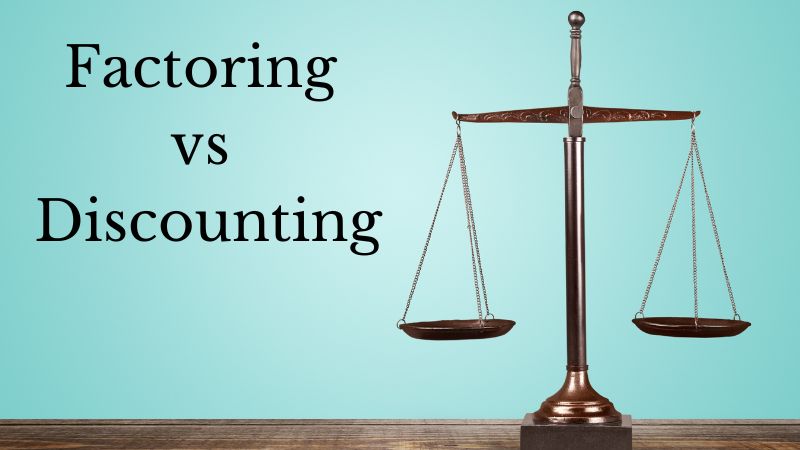Categories
Invoice Factoring vs Discounting: Options Compared

Invoice discounting vs factoring is a common debate for businesses small and large looking to raise finance against their unpaid invoices.
Invoice finance itself represents a way for your business to weather the storm of invoicing terms - that 30-day or longer period between sending out an invoice for goods supplied or services undertaken and the payment finally being made by your customer and the cash arriving in the bank.
Many businesses struggle with cash flow during this period, and when your total of accounts receivables mounts up, it can become harder and harder to cover the day-to-day running of the business.
Efficient utilisation of invoice finance can free up working capital to cover costs and expand the business.
Note: If you need a hand making the decision for your business, speak to our specialists today and we'll help you get clarity on your options.
Contents
Invoice Discounting - A Brief Overview
Invoice Factoring - A Brief Overview
Invoice Discounting vs Factoring
Making the Choice - with Clifton Private Finance
Invoice Discounting - A Brief Overview
Invoice discounting is money that is obtained against your accounts receivable (the total of money owed to you in outstanding invoices). It can be either a one-off arrangement that takes the form of a loan (known as part, or selective discounting), or an ongoing line of credit account that allows you to dip in and out as needed (full, or entire discounting).
In both cases, invoice discounting provides a discrete method of freeing up the money owed to you by your clients.
Invoice Factoring - A Brief Overview
Invoice factoring is a system whereby you effectively sell the outstanding debt to a third party, the factoring company, handing over the credit control to them.
This means that the factoring company contacts your clients directly to obtain payment and you are free to continue with your business no longer worrying about when the invoices will be paid.
Like full invoice discounting, invoice factoring works as an ongoing line of credit arrangement between you and the factoring company. This is an efficient way of working that minimises administration and risk assessment, and means that once set up, you can utilise invoice factoring as and when you need it.
See the latest market news below.
2024 Business Finance Market Update
In the past year, business finance saw significant growth, perhaps surprisingly driven by challenger lenders and alternative finance providers. Many of these lenders reached their largest milestones in 2024, primarily through supporting SMEs that may have struggled to access traditional funding elsewhere.
Businesses are continuing to face significant economic challenges carried over from 2023. High inflation, supply chain disruptions, and geopolitical tensions persist, which have complicated financial planning and made it difficult for businesses to acquire funding.
But the Bank of England has cut its base interest rate for the first time in 4 years, signalling a cautious shift toward economic stabilisation after years of inflationary pressure. Further cuts are anticipated, and businesses can expect a flurry of spending in the coming months.
As well as this, a number of banks and large firms seem to be racing to the finish line to implement generative AI and new technology that could streamline business and boost profits. Enhancing tech in banking looks like a win-win for lenders and borrowers, offering more personalised financial solutions and a quicker, more secure process.
In the tech industry, investments in AI are reshaping business. Tech giants like Alphabet, Amazon, and Microsoft have seen their market values surge, driven by the rush to implement AI.

Invoice Discounting vs Factoring
Once you’ve made the decision to consider invoice financing, how do you make the choice between discounting vs factoring?
Here are the 4 things you need to think about:

1. Invoice Factoring’s Elephant in the Room - Your Client Relationship
The most obvious, and most important, differentiation between invoice factoring and invoice discounting, is that with factoring, the invoice financing process is no longer discrete.
Because you have passed the debt owed to the factoring company, they are going to contact your client directly to receive payment.
Factoring companies are not debt recovery agencies, however, and so this contact isn’t accompanied with threatening letters or aggressive languages; they’re a financial institution providing a service.
Typically, any ruffled feathers can be easily smoothed, meaning the damage that you may feel will be done between you and your clients is significantly less than imagined.
Nonetheless, there is no real way of knowing how a client will react when being approached in this way. Some simply have a prejudiced viewpoint of invoice factoring and no amount of calm logic or reassurance is going to sway them from their feeling of being treated as bad debtors.
On the other hand, invoice discounting is a private loan or line of credit arrangement between you and your financier - none of your clients will be aware of it, nor in a position to concern themselves with how it affects your relationship with them.
It is for this reason that many companies choose discounting over factoring.

2. Invoice Discounting - Bigger Business Finance
So, why not always choose invoice discounting?
The truth is that discounting is a greater risk for the lending company.
They don’t have control over the invoice, so they are providing your business with a line of credit and putting trust in you to repay it. This requires a certain amount of business credibility - not just in your business, but in the companies you are providing goods and services to.
When a lender assesses a company for invoice discounting, they look into your invoicing history as well as your business credit report, and they want to see enough positive activity there to mitigate the risk.
Does that mean that invoice discounting is only for bigger businesses? No, not entirely, but it is somewhat harder for a smaller, less established enterprise to access when compared to invoice factoring.


3. Fees - How Does Invoice Factoring Fare vs. Discounting?
The cost of both invoice factoring and discounting is a very important factor.
For full invoice discounting, fees come at the setup stage, where the line of credit is established, plus interest is paid on the amount of credit drawn against the account.
This makes discounting quite flexible as if there’s little need to use the facility then the interest paid is lower (or zero). The setup fees are determined based on the size of the line of credit facility, which is itself based on your business turnover.
Part invoice discounting, or selective invoice discounting, is a one-off loan utilising the invoice as collateral. It differs from the full invoice discounting in that there is no line of credit and thus no ongoing fees, but the LTV size of the loan and interest rates will be affected by multiple factors, including your business credit history and the risk assessment of the financing.
Is there a clear winner here? Not really.
Both factoring and discounting have too many factors involved in their fee calculation to be able to accurately provide a clear contrast in a non-specific manner, and the assessments done for each are similar enough that the fees are likely to be very close.
It is worth noting that both full invoice discounting and invoice factoring create a line of credit where the amount of usage determines ongoing fees or interest. Once set up, it is possible to relax with the system in place and only lean on it when necessary.


4. Dealing with Bad Debt
Because invoice factoring moves credit control from your business to that of the factoring company, there is a sense that you can hand over troublesome clients and let someone else deal with getting the money paid - and, up to a point, that’s correct.
In many cases, the contact between a professional factoring company and a client who has been delaying payment will be enough to shake up the situation, putting pressure on them to pay up.
That said, there are some factoring companies who are willing to work as collection agencies and have their own debt collection departments. It is always worth discussing the contract to understand where ultimate responsibility lies.
Conversely, invoice discounting never provides any sort of credit management level, and you will be expected to repay your debt to the finance company irrespective of your clients meeting their responsibilities.
Making the Choice - with Clifton Private Finance
If your finances are constantly stretched trying to get from invoice generation to client payment, then invoice financing could well hold the answer for you - and you don’t need to do it alone.
At Clifton Private Finance, our team of advisors are experts in invoice finance and are here to help you get the facility you need to ensure your cashflow is never put under strain. Contact us today to speak to a specialist invoice finance advisor.









